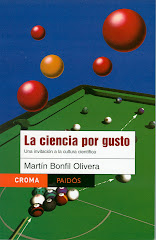by Martín Bonfil Olivera
Published on Milenio Diario, April 8, 2009
 The human brain tends to simplify. We like to understand things in terms of black and white, good or bad… And we also like to think that things can be defined with clarity: that they have an essence.
The human brain tends to simplify. We like to understand things in terms of black and white, good or bad… And we also like to think that things can be defined with clarity: that they have an essence.A problem when understanding Darwin's theory is the definition of biological species. Although Darwin himself avoided defining it ("…I look at the term species as one arbitrarily given, for the sake of convenience, to a set of individuals closely resembling each other, and that ...does not essentially differ from the term variety"', he wrote in The origin…), he didn't deny the existence of species. Nobody confuses dogs with horses, after all.
The usual criteria to define a species is "reproductive isolation": if two animals or plants cannot mate, or they produce sterile descendants, they belong to different species. But if, however, no matter how different they look, they can mate (like dog breeds), they belong to the same species.
But the reproductive criteria is not infallible (there are canine breeds that don't mate just due to reasons of size), and does not always apply: there are many asexual organisms; bacteria, for instance. Besides, as mentioned here in last week's post a lot of these organisms exchange genes "laterally" (not from parents to progeny, but by a mechanism similar to a "contagion"), so even a more modern criterion, such as gene analysis, does not always allow a clear distinction among species.
On the other hand, saying that "species evolve" is confusing: if a species changes, it turns into another one. So, do species change, or do they just disappear to leave room to other species?
The problem, philosopher Daniel Dennett explains in his revealing book Darwin's dangerous idea, is that what characterizes a species is not the presence of a certain essence that defines it, but the absence of the intermediate forms between one species and the other.
Species are not collections of identical organisms: they are more like clouds of individuals with almost identical genomes, but with little variations. We say that there are two distinct species when between two of these genome clouds there is an empty space; in the opposite case, we talk of varieties. As always, in science things are not as simple they are said to be.
(translated by Adrián Robles Benavides) To receive Science for pleasure weekly
in your email, subscribe here!




No comments:
Post a Comment